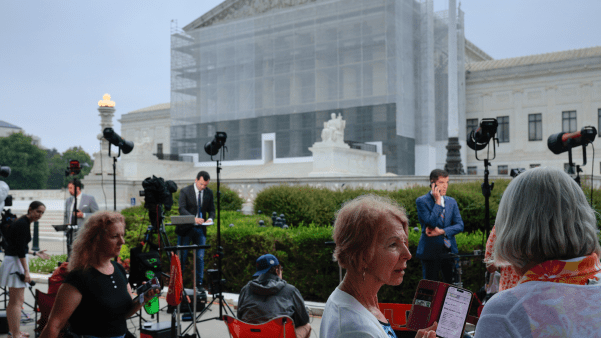The last time I saw Larry, I had recently interviewed one of the most compelling examples of the miraculous I have ever known. Jeff, a young man in my church, had fully expected to spend his life in a wheelchair.
Years of multiple surgeries had done nothing for him, and one of the top specialists in the country had told him to stop hoping for a cure and accept the excruciating pain as it was. Then, at the invitation of a friend, he rolled his wheelchair into a Pentecostal church one Sunday morning. He walked out pain-free. That was four years ago. He has never felt pain in his feet since. At a word of prayer, he was completely, instantly healed.
Curious to hear what a doctor thought, I related Jeff's story to Larry.
Even as I spoke, I felt from Larry's body language that he wasn't convinced.
Larry is a dedicated Christian who takes the Bible at face value when it describes miracles. But as a doctor—and typical of many doctors—Larry is skeptical of stories of miracle healing. He sees many sick people, and he knows that things happen to them that are hard to predict and explain. Some people get worse unexpectedly. Other people get better. You can't always say why.
Larry wasn't denying the possibility that Jeff had experienced a miracle. He was just saying that people sometimes heal in the most surprising ways, that the link between mind and body is amazingly strong, and that he wouldn't put too much weight on the claim that God miraculously healed Jeff.
He also doubted whether the issue was that important.
"Isn't the resurrection of Jesus Christ a great enough miracle?" Larry asked me. "If God raised Jesus from the dead after three days in the grave, and demonstrated it in public, why do we need anything else?"
Larry believes our faith should focus on Jesus and his resurrection. That is enough for him. He isn't looking for miracles to reinforce his faith, and he's not praying for miracles to heal his patients. He's content to apply his skill as a doctor and leave the results in God's good hands.
Give Me a Sign
Larry represents a tradition in Protestantism that can be traced back to the Reformation. He believes in God's power to do miracles but doesn't see it much in the present. And he doesn't see miracles—whether they happen or not—as terribly important.
Yet we live in a Pentecostal age. Around the world, wherever churches are growing, reports of miracles are rampant. Many Christians regard miracles as extremely important.
In recent years I've spent considerable time reading, interviewing, and thinking about miracles—not to mention praying for them. Nothing has proven more helpful to me than simply considering the biblical terminology.
The Bible has no word exactly like miracle. Rather, the most typical word is sign. There's a whole worldview packed into that word. Modern Americans tend to think of miracles as "proof"—proof that God is real and powerful, that he can break into the natural world with supernatural power. But sign points in another direction.
I can think of two occasions when signs mean a lot to me. One is when I come home from a long trip. Just on the north side of the Golden Gate Bridge is a sign for my hometown. Santa Rosa, it reads, 57 miles. I always get a warm feeling when I see that sign. I am on my way home.
Signs matter more urgently when I get lost. I may wander helplessly up one street and down another, confused and frustrated. I may even grow frightened if it's late or raining or if I'm in a tough neighborhood. Then I happen on a sign that points me toward my destination. Immediately I am flooded with relief. I know where I am and how to get where I am going.
Yet in neither case do I ever stop to admire the sign. And when I arrive at my destination, I never tell others about the sign. It is hardly worth mentioning. It served only to point me on my way.
As Colin Brown, a theology professor at Fuller Seminary, writes, "When I drive along the free-way and see a green sign that reads 'Pasadena: Next 11 Exits,' I am not being treated to a logical demonstration that each and all of the next 11 off ramps will lead me to Pasadena. I am being given a pointer. Only in following the directions of the sign do I discover whether the sign is telling the truth or not."
Brown also writes, "Miracles are like warning flags. They signal the presence of a different order of reality that is present in the midst of our everyday world."
Signs are never ends in themselves. They do not point to themselves. They are not proof of anything in themselves. They exist not to make us think we have arrived, but to lead us somewhere new.
Miraculous Symptoms
Understanding miracles as signs helps to smooth out the New Testament's incongruities regarding miracles. Jesus was certainly a miracle worker, but at first glance he seemed to have contradictory ideas about them. He criticized the Pharisees and Sadducees when they demanded that he prove himself by doing miracles. "A wicked and adulterous generation asks for a sign!" he told them (Matt. 12:39).
The crowds also wanted to see a sign so "that we may see it and believe you" (John 6:30). They reminded Jesus that Moses had provided manna. Surely Jesus could do so as well.
In response, Jesus spoke of God giving them "the true bread from heaven." When they asked for it he said, "I am the bread of life. Whoever comes to me will never go hungry" (6:35). He was not going to provide them with miraculous manna, though he could have. Instead he provided himself.
Everything that happens in creation is pregnant with the power and the presence of God. Nowhere you can go escapes him. Nothing that happens, happens apart from his will. Everything is natural and supernatural at the same time.
And yet, when Jesus confronted the religious leaders about their unwillingness to believe, he spoke of miracles. "The works I do in my Father's name testify about me," he said (John 10:25). When they were ready to stone him for blasphemy, he told them, "I have shown you many good works from the Father. For which of these do you stone me?" (10:32). Commented John: "Even after Jesus had performed so many signs in their presence, they still would not believe in him" (12:37).
Jesus also often tried to hush up his miracles, telling those he healed to keep it to themselves. Why? How to make sense of this?
The answer has to do with the nature of signs.
Jesus' miracles pointed toward the kingdom of God breaking in. Anybody (like some Pharisees) who saw that and pretended not to get the message was a hypocrite. They might say they were looking for light, but in truth they didn't want to see it. They saw the highway sign and decided to take another route.
The point wasn't signs and wonders. They were symptoms more than substance. They pointed forward, not to themselves. And thus those who focused on the signs, demanding more, were stuck in the present order, missing the point.
The apostle Paul offers the same incongruity in a different form. Like Jesus, he was known for miracles. After his miraculous conversion he began to travel with Barnabas. Acts 14:3 says that God "confirmed the message of his grace by enabling them to perform signs and wonders."
Paul and Barnabas went to Jerusalem to defend their ministry before a church council, and there they described "the signs and wonders God had done among the Gentiles through them" (15:12). Luke records that in Ephesus, "God did extraordinary miracles through Paul, so that even handkerchiefs and aprons that had touched him were taken to the sick, and their illnesses were cured and the evil spirits left them" (19:11-12).
Paul wrote to the Corinthians that they had seen in his ministry "the marks of a true apostle, including signs, wonders and miracles" (2 Cor. 12:12). He wrote to the Romans about "what Christ has accomplished through me in leading the Gentiles to obey God by what I have said and done—by the power of signs and wonders, through the power of the Spirit of God" (Rom. 15:18-19). Clearly for Paul, just as for Jesus, gospel work was accompanied by signs and wonders.
But Paul's letters to the churches never indicate that he expects Christians to heal or to cast out demons. He gives instructions about marriage and family, about Communion and prayer, about many practical aspects of life. But he never gives instructions about the ministry of miracles. Arguments from silence are unreliable. Just because he didn't tell them to do it doesn't prove he didn't want them to do it. It is striking, though, how different his priorities were from some who practice healing and exorcism today. They talk about doing miracles every chance they get. Paul didn't.
Surely the New Testament tells us two crucial facts about miracles: Christian ministry is marked by them, but Christian ministry doesn't focus on them. That's a delicate balance that many get wrong. Some people make no place for miracles. Others act more interested in miracles than in Jesus.
With all respect, I think my friend Larry was wrong when he said Jesus' resurrection is the only miracle we need. It was not enough for Jesus, after all. The signs of the kingdom that he displayed throughout his life prepared the way for those who saw him raised from the dead. And if I read the New Testament rightly, it is the same with us. The signs we see prepare the way for the fullness of the kingdom, when we shall live a resurrected life.
We are responsible to be open for signs of God's wondrous presence, and to pray for them. We are responsible to praise God when we see miracles, and to think about what message God has for us in them.
We are equally responsible not to go pursuing signs and wonders as though they were the ultimate good that God intended. We are responsible not to demand miracles as proof that God is present. They are not the substance of the kingdom; they are symptoms of the kingdom. The substance is Jesus, who suffered, died, and was buried, then was raised again to life.
Nature vs. God?
Much confusion about miracles—both over-fascination and skepticism—comes from a train of thought developed during the Enlightenment and now deeply embedded in Western minds. That confusion is the separation of nature and super-nature.
In the late 17th century, a devout Christian, Isaac Newton, applied his mind to unraveling the secrets of the universe. His discovery of gravity and the laws of motion helped him analyze planetary orbits. He invented calculus in order to make precise calculations, enabling astronomers to track each planet and moon so carefully you could set your watch by the moons of Jupiter. Everything was perfectly in its place and completely predictable. An image of a silent, perfect, mechanical universe grew up—the universe as a machine.
Later, other sciences made their contributions—biology, particularly, with its discovery of genetics. Now not only the solar system but also a tree could be fully explained through "laws of nature" that described how its mechanism worked—and has to work. Diseases, once the province of evil spirits or bad humors, could be explained as the predictable workings of minute organisms. And diseases could be cured!
Naturally, many people who come to believe in such a mechanical universe eventually become skeptics about God. "I had no need for that hypothesis," French astronomer Pierre-Simon Laplace was reported to have told Napoleon when asked about the place of the Creator in his work.
Still, some people maintain belief in an active God. They recognize the machine-like aspect of creation, but they insist that God occasionally intervenes in the world in a supernatural way. They divide the world into "nature" and "super-nature"—between the way the world runs on its own, like a machine, and the occasional interventions of God. Newton, for example, thought that God occasionally had to step in to adjust the planets in their orbits, lest they get out of synchrony.
Supernatural events, by this way of thinking, are occasions when God interferes with the natural machinery. He steps in and zaps the cancer. He turns the water into wine. He puts his finger on a gear in the machine of nature and makes it turn in a different direction.
People who absolutely separate nature from super-nature call these supernatural occasions when God steps in "miracles."
Signifying Something
A little thought, however, will suggest that the separation of nature from super-nature is unbiblical. Is God not the Creator and Sustainer of all that is? Consider weather. Surely Scripture speaks of the clouds as God's chariots, and tells of everyday weather events as acts of God's power. (He sends rain on the just and the unjust.) These facts are not in tension with the science of meteorology.
Everything that happens in creation is pregnant with the power and the presence of God. Nowhere you can go escapes him. Nothing that happens, happens apart from his will. Everything is natural and supernatural at the same time.
I recommend that we go back to the wisdom of Augustine, who understood miracles not as violations of natural law (how and why would God violate his own work?) but as occasions when God walks on unusual paths. They are not more God-inspired than, say, the daily sunrise. They are just an unusual break from the way God ordinarily works, and thus a signal of something important.
Miracles are so unusual that we stop in wonder. By their rarity, their unusual character, they grab our attention. That is what signs do. They stand out from their environment so that we notice them. Otherwise, how could they point?
Jesus' feeding of the 5,000 was in one sense far less significant than an event no one comments on at all: the wheat harvest. It strains belief that a desiccated kernel of wheat can be transformed into a wheat plant. Year after year it happens in thousands of locations around the world. It feeds the world by the power of God, but nobody marvels.
Let Jesus multiply a lunch, once, for a crowd of a few thousand, and we do wonder. Not that it is more significant or God-empowered than the wheat crop. Only that it is a rarity we never see. It is a sign—that Jesus, through whom wheat was made, and who sustains and empowers its growth—is on the move in an unusual way: his kingdom, long promised, is breaking in.
Tim Stafford is the author of Miracles: A Journalist Looks at Modern Day Experiences of God's Power (Bethany House), from which this article was adapted. Go to ChristianBibleStudies.com for "The Meaning of Miracles," a Bible study based on this article.










